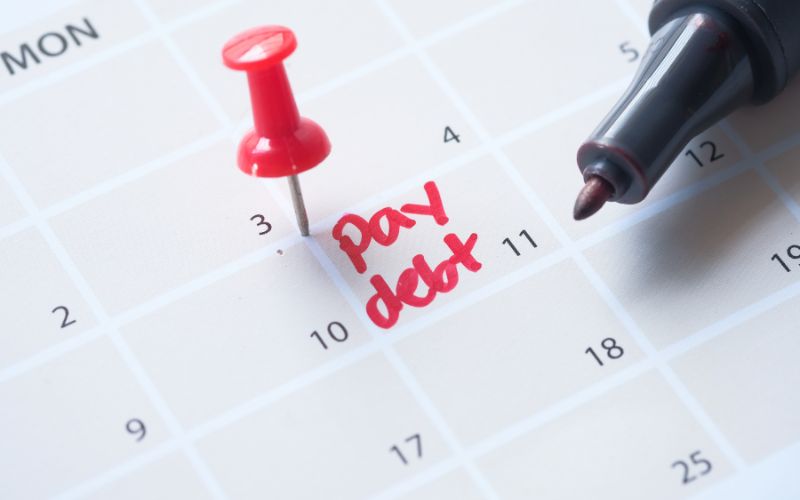Getting a month ahead on your bills can seem like a daunting task, especially if you’ve been living paycheck to paycheck.
However, it’s an achievable goal that can offer you a sense of financial security and freedom.
By taking control of your finances and implementing some effective strategies, you can work towards having a buffer to cover your upcoming expenses.

The first step to getting ahead of your bills is to create a comprehensive budget.
This allows you to see where your money is going and helps you make informed decisions on how to allocate your income.
Break down your expenses into categories such as housing, food, bills, entertainment, and transportation.
Don’t forget to include any unique categories that are specific to your financial situation, like childcare or medical expenses.
Taking a proactive approach to reduce your expenses and save money is essential. One way to do this is by using cashback apps and negotiating your bills.
Additionally, consider selling unused items or finding side gigs to bring in extra income.
Stay committed to the goal of getting a month ahead on your bills, and you’ll soon experience the financial security you desire.
Understanding the Concept
Getting a month ahead on bills means having enough money saved up to cover your financial obligations without relying on your current paycheck.
When you achieve this goal, you can break free from the paycheck-to-paycheck cycle and enjoy more financial stability.
To start, take a close look at your income and expenses. Analyse your monthly earnings from all sources like your job, side hustles, and investments.
Then, track your spending by examining each category, such as housing, utilities, groceries, and entertainment.
This will give you a clear picture of your financial situation, and it’s the first step towards getting one month ahead on bills.
As you review your finances, consider the following strategies to help you save money and make progress:
- Create a budget: A well-crafted budget will help you stay on track with your spending and saving goals.
- Reduce expenses: Identify areas where you can cut back, such as dining out, subscriptions, or shopping.
- Increase income: Explore opportunities to earn more, like taking on a part-time job or starting a side hustle.
In addition to these strategies, you might consider opening a separate account specifically for your one-month-ahead savings goal.
This can make it easier to track your progress and avoid dipping into these funds for other expenses.
Finally, take advantage of any financial windfalls or unexpected income, such as bonuses, tax returns, or gifts, to help you get a month ahead on bills.
By staying consistent and disciplined in your efforts, you can eventually break the paycheck-to-paycheck cycle and gain greater control over your finances.
Benefits of Having a Month Ahead on Bills

Getting a month ahead on bills provides numerous advantages that can significantly improve your financial situation and overall well-being.
One of the primary benefits is the peace of mind it offers.
When you have a buffer in place to cover your bills, you no longer have to worry about which paycheck will cover which expense.
This reduces the stress that comes with living paycheck-to-paycheck and allows you to manage your finances more effectively.
Another significant advantage of being a month ahead is the level of financial freedom this provides.
When you have funds on hand to cover immediate expenses, you can start to allocate your income towards other financial goals, such as saving for a down payment on a house, building an emergency fund, or contributing to your retirement.
This financial flexibility can have a profound impact on your overall financial health, as well as your ability to make choices that align with your values and priorities.
Stress, particularly financial stress, can have a detrimental effect on your mental and physical wellbeing.
By getting a month ahead on bills, you’ll be able to reduce the pressure that comes from constantly worrying about making ends meet.
Knowing that you have the funds available to cover your expenses gives you the opportunity to focus your energy on other important aspects of your life, such as work, family, and personal growth.
In conclusion, being one month ahead on bills offers several benefits, including peace of mind, financial freedom, and reduced stress.
Taking steps to reach this financial milestone will not only help to alleviate financial stress but also allow you to experience a more balanced and fulfilling life.
Assessing Your Financial Situation
To get a month ahead on bills, it’s crucial to first assess your financial situation.
Start by listing all your monthly expenses, including rent or mortgage payments, utilities, groceries, insurance, and any other recurring bills.
This helps you gain a clear understanding of your monthly budget.
Once you’ve documented your expenses, take a look at your income. Knowing the exact amount that comes in each month will help you create a realistic budget.
With this information in hand, compare your income and expenses to determine if you’re spending within your means or need to cut down on certain expenses.
Next, consider your savings. Set up an emergency fund if you haven’t already.
Aim to save at least three to six months’ worth of expenses in this account to provide a safety net in case of unexpected events or emergencies.
After setting up an emergency fund, focus on saving for long-term goals such as retirement, home ownership, or further education.
It’s essential to allocate a portion of your income towards these goals each month and to make adjustments to your budget if needed.
Finally, consistently review and update your financial situation.
Regularly track your spending and maintain your budget to ensure you’re staying on track with your financial objectives.
Through careful planning and commitment, you can work towards getting a month ahead on your bills and meeting your financial goals.
Setting Up a Budget

Creating a budget is essential for managing your finances and staying one month ahead on your bills.
To establish a monthly budget, begin by listing all sources of income such as your wages, investments, and side jobs.
Next, write down your regular expenses, including rent or mortgage payments, utility bills, childcare costs, insurance, and transportation fees.
It’s essential to track your spending for a couple of months to get a complete understanding of your financial habits.
Various budgeting apps can help you monitor your expenditures on the go, making it easier to stick to your budget.
Once you have a clear picture of your income and expenses, it’s time to allocate a specific amount to each category.
This divvying up will help you ensure that you always have enough funds to cover your bills and other necessities.
Additionally, you may want to consider using a budgeting app or software like You Need a Budget to streamline the process and keep your spending in check.
While setting up your budget, it’s crucial to plan for occasional or unexpected expenses, such as medical bills, car repairs, or holiday expenses.
One effective method for handling a variable income is to implement systems that help you manage your budget and ensure you have enough money for bills and other expenditures.
By consistently following your budget and making necessary adjustments as needed, you’ll be well on your way to getting one month ahead on bills, sleeping better at night, and reaching your financial goals.
Devising a Savings Plan
A well-thought-out savings plan can help you get a month ahead on your bills and alleviate financial stress.
The first step in creating your plan is determining your savings goals.
Consider your monthly expenses and calculate how much you would need to cover them for one month.
This will form the basis of your target amount for your emergency fund.
Next, choose a suitable savings account to hold your emergency fund. Look for an account with a competitive interest rate and minimal fees.
This will help maximise your savings growth over time.
Remember to keep your emergency fund separate from your everyday spending account, making it easier to avoid dipping into these savings for non-emergency expenses.
Once you’ve set your savings goals and chosen a suitable account, it’s time to work out a realistic strategy to reach these goals.
Start by reviewing your current spending habits and identifying areas where you can cut back.
For example, you might consider 23 money-saving tips to reduce your expenses, such as cutting out takeaway meals, shopping sales, or comparing utility providers for better deals.
Another approach to reaching your savings goals quicker is to increase your income.
This could involve taking on additional part-time work, freelancing, or starting a side hustle.
Any extra income you earn can be channelled directly towards your savings account, helping it grow faster.
Lastly, staying disciplined with your savings plan is crucial for success.
Track your progress monthly and make adjustments when necessary to ensure that you’re staying on course to get a month ahead on your bills.
Don’t be disheartened if progress is slow at first – remember that consistency pays off in the long run.
Keep focused on your goal and continue making smart financial decisions, and you’ll find yourself one month ahead on your bills before you know it.
Creating Additional Income Streams

Earning extra income can be daunting at first, but it’s a great way to get ahead financially and help cover your bills.
To achieve this, consider diversifying your income streams.
Some popular strategies include finding a side hustle, taking on a part-time job, and tapping into windfalls or extra paychecks.
A side hustle is an excellent way to generate additional cash outside of your regular job. It allows you to explore your passions and skills while earning extra money.
Popular side hustles include freelance graphic design, pet sitting, and selling handmade goods like candles or jewellery.
Taking on a part-time job is another practical approach to secure extra income.
Seek out positions that complement your current skills or schedule, such as working evenings or weekends.
Retail, hospitality, and delivery driving are common choices for part-time employment.
When you receive extra paychecks or unexpected income, save it instead of spending.
This provides a financial cushion for helping you stay ahead on bills in future months. Additionally, consider setting up automatic savings transfers.
By doing so, you can build a buffer without even thinking about it.
By combining these strategies, you can create a more stable financial situation and get one month ahead on your bills.
Remember, the key is to find opportunities that work best for you and align with your goals, resulting in a smoother path to financial success.
Managing Your Expenses
Effectively managing your expenses is a crucial step in getting ahead on your bills.
To start, you should take the time to list down all of your regular expenses and divide them into categories.
Primary categories may include fixed expenses, variable expenses, and discretionary expenses.
Fixed expenses are those that remain the same every month, such as rent or mortgage payments, insurance, and certain utility bills.
It’s essential to prioritise these expenses, as they are the foundation of your financial stability.
Variable expenses can change from month to month, such as groceries, transport costs, and medical expenses.
To manage these, consider setting a budget for each category and track your spending to ensure you stay within your limits.
Discretionary expenses include non-essentials like entertainment, dining out, and vacations.
It’s essential to keep a close eye on these and reassess if necessary, as they can quickly impact your ability to get one month ahead on bills.
Another practical approach to managing expenses is evaluating your subscriptions and memberships.
Cut down on any unnecessary subscriptions and consider alternatives for others.
For example, if your gym membership isn’t being utilised enough, you could switch to a pay-as-you-go plan or look into free workout resources online.
Create a system for managing your bills and setting reminders for payment due dates. This will help you stay organised and avoid late fees.
Make use of budgeting tools and apps to help you track your expenses more effectively, making it easier to stay accountable and stick to your financial goals.
By adopting these strategies, you can confidently manage your expenses and work your way towards getting a month ahead on your bills.
Paying Off Your Debt

To get a month ahead on your bills, focusing on paying off your debt is essential. Firstly, it’s crucial to know what you owe and have a clear picture of your debt.
This includes understanding how much you owe, the interest rates you’re paying, and the time required to pay off your debt under your current plan.
Creating a budget will help you manage your debt payments. Determine how much you can afford to allocate towards your debt each month.
Don’t forget to prioritise high-interest debts, as they cost you more in interest over time.
Consider cutting down on your expenses to free up more money for debt payments.
This could involve reducing discretionary spending on entertainment, dining out, or other non-essential items.
You can also evaluate your recurring subscriptions and eliminate the ones you don’t use or need.
Taking up a side hustle or part-time job can support you in getting ahead on your bills.
The extra income earned can be directed towards your debt payments, allowing you to become debt-free more quickly.
Finally, consider paying off your debt with any windfall or unexpected income, such as a bonus or tax refund.
This can give you a significant boost in your journey to become debt-free and eventually get a month ahead on your bills.
Remember, the sooner you pay off your debt, the more financially secure and stable your future will be.
Using Unexpected Money Wisely
When you receive unexpected money, such as a bonus, windfalls, tax returns, or a raise, it’s essential to use it wisely to get ahead on your bills.
By making smart decisions with extra funds, you can quickly achieve financial stability and reduce the stress of living paycheck to paycheck.
Firstly, consider allocating a portion of your unexpected income towards increasing your emergency savings.
This will provide you with a safety net for unforeseen expenses, such as medical bills or car repairs.
Aim for building an emergency fund that can cover at least three months’ worth of expenses.
Next, use your windfalls and extra cash to pay down any high-interest debts, such as credit cards or personal loans.
By doing this, you’ll save on interest payments and improve your financial security.
It is also essential to remain disciplined and resist the temptation to spend this money on unnecessary items or experiences.
Another option for utilising your extra funds is to put it towards reaching your goal of being one month ahead on your bills.
This strategy creates a buffer and eases the pressure to constantly meet your financial obligations.
By having a month’s worth of bills covered, you’ll be able to focus on other essential financial goals, like saving for a house deposit or investing in your future.
Moreover, consider using cashback programs like Rakuten to earn additional savings on your regular expenses.
This extra money can be put towards getting one month ahead on your bills, thus ensuring you further secure your financial wellbeing.
Remember, by being disciplined and strategic with your unexpected income, you can significantly improve your financial situation by getting a month ahead on your bills.
Maintain this mindset, and soon you’ll enjoy the peace of mind that comes with financial stability.
Adopting a New Financial Mindset

Developing a new financial mindset is essential for getting a month ahead on bills.
It begins with setting clear financial goals and prioritising what’s important to you.
By focusing on your financial objectives, you can better allocate your resources and pave the way for long-term success.
Establishing a budget is a crucial step in this process. Determine the total amount you need to save in order to cover your monthly expenses in advance.
With a clear target in mind, commit to channelling your savings toward this goal.
Incorporate a no-spend challenge to speed up the process.
This could be done by setting a goal like a 30-day no-spend challenge, in which you refrain from any unnecessary expenses.
This exercise will not only accelerate your savings but also instil a sense of discipline in your financial management.
Practising discipline in other aspects of your financial life is also essential.
For example, consider setting up a separate account exclusively for your savings.
This way, you can keep track of your progress and ensure that the funds intended for your goal aren’t mingled with your daily transactions.
To get a month ahead on bills and demonstrate consistent progress, consider exploring additional income sources like a side hustle or a part-time job.
These extra earnings could be used to propel your savings and ultimately give you a financial cushion.
Remember, adopting a new financial mindset is the key to achieving your goals. Your confidence and commitment to change will make all the difference.
Focus on budgeting, completing no-spend challenges, and maintaining discipline to transform your financial future.
Avoiding Common Pitfalls
Late fees can add up quickly and make it even more difficult to get ahead on your bills.
To avoid these, ensure that your monthly expenses and due dates are well-organized.
Set reminders or use automatic payments to make certain that you don’t miss any deadlines.
Eliminating late fees will free up funds to allocate towards getting a month ahead on your bills.
A common struggle many people face is living paycheck to paycheck.
This way of life can lead to financial stress and make it challenging to get a month ahead on your bills.
To break this cycle, consider examining your expenses closely and finding ways to cut down on unnecessary spending.
This may involve cancelling unused subscriptions, dining out less frequently, or shopping sales more often.
Implementing a strict budget and reducing expenditures will allow you to gradually save up enough money to cover a full month’s worth of bills in advance.
Stress associated with financial struggles can weigh heavily on your mental and physical well-being.
To manage this stress and maintain a clear mindset, take the time to re-evaluate your financial goals and priorities.
Actively seek solutions to your financial challenges, such as increasing your income through a side hustle or looking for opportunities to save on everyday expenses.
It’s essential to focus on small, achievable goals that will eventually lead to being a month ahead on your bills.
Remember, getting a month ahead on bills takes time and consistent effort.
By avoiding these common pitfalls, staying organized, and making informed decisions, you will gradually work towards a more secure financial future.
